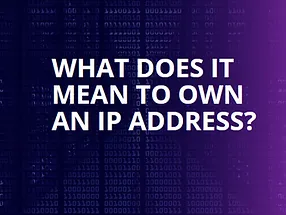What Does It Mean to Own an IP Address?
An IP address is a unique identifier assigned to devices that enables them to communicate over the internet. IP addresses are grouped into blocks or ranges.
When you own an IP address block, you have the authority and responsibility to manage the allocation and use of the IP addresses within that block.
This ownership is usually granted by a regional Internet registry (RIR) or an Internet service provider (ISP). An RIR is an organization that oversees the distribution and registration of IP addresses. There are five RIRs worldwide, each with their own geographic coverage. Meanwhile, ISPs are typically private companies that allocate IP address blocks to their customers.
IP addresses are a limited resource. Ownership of IP address blocks is subject to various policies and regulations set by the RIRs or other governing bodies. The process of obtaining an IP address block typically involves demonstrating a legitimate need and meeting certain criteria, such as demonstrating efficient utilization of the addresses.
When you own an IP address block, you can do the following:
Address Assignment
As the owner, you can assign specific IP addresses from the block to your devices or network infrastructure. This allows you to control the IP addresses used by your organization or network.
Subnetting
You can divide the IP address block into smaller networks. Subdividing a block into smaller network is commonly known as subnetting. This enables you to create separate networks within your organization or allocate addresses to different locations or departments. Subnetting is done to create a better organized, more secure, and more performant network.
Routing
IP address blocks are used in routing tables to direct network traffic between different networks. As the owner, you have the authority to configure the routing tables and determine how traffic flows within your network and beyond.
IP Address Management
You are responsible for managing and maintaining the IP addresses that you own. This includes tracking usage, ensuring efficient allocation, and handling any necessary changes or updates.
Revocation of Your Ownership
It is possible for a regional Internet registry (RIR) to reclaim or take away a block of IP addresses under certain circumstances. RIRs have policies and guidelines in place to ensure efficient and fair allocation of IP addresses and to prevent misuse or hoarding of address space. If an organization is found to be in violation of these policies or if there are specific reasons that warrant reclamation, the RIR may take action to reclaim the IP address block.
There are a few scenarios in which an RIR may reclaim an IP address block. Each RIR has their own policies. For this example, we’ll focus on the revocation policies by ARIN.
Non-Compliance to Policies
If an organization fails to adhere to the policies and requirements set by the RIR for IP address allocation and usage, the RIR may reclaim the address block. This could include situations where the organization is not efficiently utilizing the addresses, violating the terms of the allocation agreement, or engaging in unauthorized transfer or sale of addresses.
Dissolution or Closure
If an organization ceases to exist or is no longer operating, the RIR may reclaim the IP address block allocated to that organization. This ensures that the address space is returned to the pool of available addresses and can be reallocated to other entities.

Fraudulent or Misleading Information
If an organization provided fraudulent or misleading information during the allocation process, or if it was discovered that the information provided was inaccurate or misrepresented, the RIR may reclaim the IP address block.
RIRs typically follow a multi-step process before reclaiming IP address blocks. This includes communication with the organization in question, allowing them an opportunity to rectify any issues or address concerns. Reclamation is typically considered a last resort when other measures have failed or the violations are severe.
It’s important for organizations to understand and comply with the policies and guidelines set by the RIRs to maintain the legitimacy and ownership of their allocated IP address blocks.
When your resources are revoked, they are taken out of an RIR’s database and Whois. They are then placed back into ARIN’s pool of available resources for distribution to other organizations. While you can request new resources in the future, there is no guarantee that you will receive the same ones you previously had.





Pingback: Why enterprises are adopting BYOIP ? - i.lease